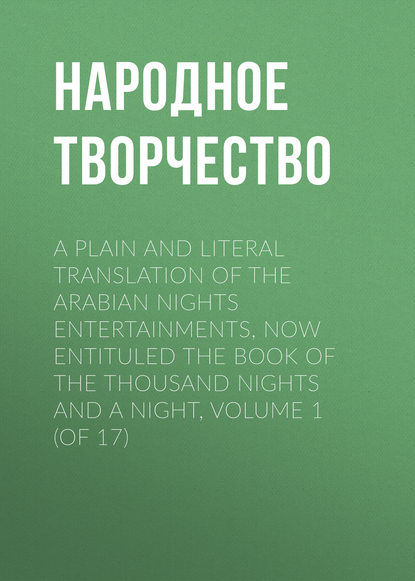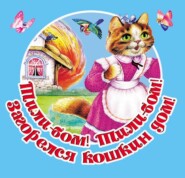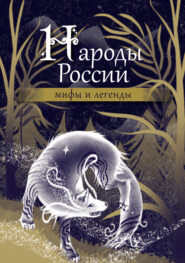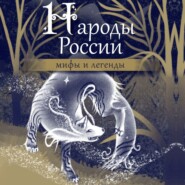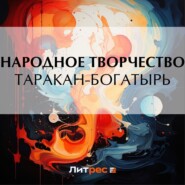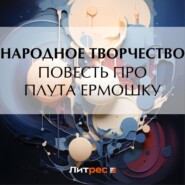По всем вопросам обращайтесь на: info@litportal.ru
(©) 2003-2024.
✖
A plain and literal translation of the Arabian nights entertainments, now entituled The Book of the Thousand Nights and a Night, Volume 1 (of 17)
Настройки чтения
Размер шрифта
Высота строк
Поля
i. e. about to fly out; "My heart is in my mouth." The Fisherman speaks with the dry humour of a Fellah.
71
"Sulayman," when going out to ease himself, entrusted his seal-ring upon which his kingdom depended to a concubine "Amínah" (the "Faithful"), when Sakhr, transformed to the King's likeness, came in and took it. The prophet was reduced to beggary, but after forty days the demon fled throwing into the sea the ring which was swallowed by a fish and eventually returned to Sulayman. This Talmudic fable is hinted at in the Koran (chapt. xxxviii.), and commentators have extensively embroidered it. Asaf, son of Barkhiya, was Wazir to Sulayman and is supposed to be the "one with whom was the knowledge of the Scriptures" (Koran, chapt. xxxvii.), i. e. who knew the Ineffable Name of Allah. See the manifest descendant of the Talmudic-Koranic fiction in the "Tale of the Emperor Jovinian" (No. lix.) of the Gesta Romanorum, the most popular book of mediæval Europe composed in England (or Germany) about the end of the thirteenth century.
72
Arab. "Kumkum," a gourd-shaped bottle, of metal, china or glass, still used for sprinkling scents. Lane gives an illustration (chapt. viii., Mod. Egypt.).
73
Arab. meaning "the Mother of Amir," a nickname for the hyena, which bites the hand that feeds it.
74
The intellect of man is stronger than that of the Jinni; the Ifrit, however, enters the jar because he has been adjured by the Most Great Name and not from mere stupidity. The seal-ring of Solomon according to the Rabbis contained a chased stone which told him everything he wanted to know.
75
The Mesmerist will notice this shudder which is familiar to him as preceding the "magnetic" trance.
76
Arab. "Bahr" which means a sea, a large river, a sheet of water, etc., lit. water cut or trenched in the earth. Bahri in Egypt means Northern; so Yamm (Sea, Mediterranean) in Hebrew is West.
77
In the Bul. Edit. "Ruyán," evidently a clerical error. The name is fanciful not significant.
78
The geography is ultra-Shakspearean. "Fars" (whence "Persia") is the central Province of the grand old Empire now a mere wreck; "Rúm" (which I write Roum, in order to avoid Jamaica) is the neo-Roman or Byzantine Empire; while "Yunan" is the classical Arab term for Greece (Ionia) which unlearned Moslems believe to be now under water.
79
The Sun greets Mohammed every morning even as it dances on Easter-Day for Christendom. Risum teneatis?
80
Arab. "Nadím," a term often occurring. It denotes one who was intimate enough to drink with the Caliph, a very high honour and a dangerous. The last who sat with "Nudamá" was Al-Razi bi'llah A.H. 329=940. See Al-Siyuti's famous "History of the Caliphs" translated and admirably annotated by Major H. S. Jarrett, for the Bibliotheca Indica, Calcutta, 1880.
81
Arab. Maydán (from Persian); Lane generally translates it "horse-course," and Payne "tilting-yard." It is both and something more; an open space, in or near the city, used for reviewing troops, races, playing the Jeríd (cane-spear) and other sports and exercises: thus Al-Maydan=Gr. hippodrome. The game here alluded to is our "polo," or hockey on horseback, a favourite with the Persian Kings, as all old illustrations of the Shahnamah show. Maydan is also a natural plain for which copious Arabic has many terms; Fayhah or Sath (a plain generally), Khabt (a low lying plain), Bat'há (a low sandy flat), Mahattah (a plain fit for halting) and so forth. (Pilgrimage iii., 11.)
82
For details concerning the "Ghusl" see Night xliv.
83
A popular idiom and highly expressive, contrasting the upright bearing of the self-satisfied man with the slouch of the miserable and the skirt-trailing of the woman in grief. I do not see the necessity of such Latinisms as "dilated" or "expanded."
84
All these highest signs of favour foreshow, in Eastern tales and in Eastern life, an approaching downfall of the heaviest; they are so great that they arouse general jealousy. Many of us have seen this at native courts.
85
This phrase is contained in the word "ihdák"=encompassing, as the conjunctiva does the pupil.
86
I have noted this formula, which is used even in conversation when about to relate some great unfact.
87
We are obliged to English the word by "valley," which is about as correct as the "brook Kedron," applied to the grisliest of ravines. The Wady (in old Coptic wah, oah, whence "Oasis") is the bed of a watercourse which flows only after rains. I have rendered it by "Fiumara" (Pilgrimage i., 5, and ii., 196, etc.), an Italian or rather a Sicilian word which exactly describes the "wady."
88
I have described this scene which Mr. T. Wolf illustrated by an excellent lithograph in "Falconry, etc." (London, Van Voorst, MDCCCLII.).
89
Arab. "Kaylúlah," midday sleep; called siesta from the sixth canonical hour.
90
This parrot-story is world-wide in folk-lore and the belief in metempsychosis, which prevails more or less over all the East, there lends it probability. The "Book of Sindibad" (see Night dlxxix. and "The Academy," Sept. 20, 1884, No. 646) converts it into the "Story of the Confectioner, his Wife and the Parrot;" and it is the base of the Hindostani text-book, "Tota-Kaháni" (Parrot-chat), an abridgement of the Tutinámah (Parrot-book) of Nakhshabi (circ. A.D. 1300), a congener of the Sanskrit "Suka Saptati," or Seventy Parrot-stories. The tale is not in the Bul. or Mac. Edit. but occurs in the Bresl. (i., pp. 90, 91) much mutilated; and better in the Calc. Edit. I cannot here refrain from noticing how vilely the twelve vols. of the Breslau Edit. have been edited; even a table of contents being absent from the first four volumes.
91
The young "Turk" is probably a late addition, as it does not appear in many of the MSS., e. g. the Bresl. Edit. The wife usually spreads a cloth over the cage; this in the Turkish translation becomes a piece of leather.
92
The Hebrew-Syrian month July used to express the height of summer. As Herodotus tells us (ii. 4) the Egyptians claimed to be the discoverers of the solar year and the portioners of its course into twelve parts.
93
This proceeding is thoroughly characteristic of the servile class; they conscientiously conceal everything from the master till he finds a clew; after which they tell him everything and something more.
94
Until late years, merchants and shopkeepers in the nearer East all carried swords, and held it a disgrace to leave the house unarmed.
95
71
"Sulayman," when going out to ease himself, entrusted his seal-ring upon which his kingdom depended to a concubine "Amínah" (the "Faithful"), when Sakhr, transformed to the King's likeness, came in and took it. The prophet was reduced to beggary, but after forty days the demon fled throwing into the sea the ring which was swallowed by a fish and eventually returned to Sulayman. This Talmudic fable is hinted at in the Koran (chapt. xxxviii.), and commentators have extensively embroidered it. Asaf, son of Barkhiya, was Wazir to Sulayman and is supposed to be the "one with whom was the knowledge of the Scriptures" (Koran, chapt. xxxvii.), i. e. who knew the Ineffable Name of Allah. See the manifest descendant of the Talmudic-Koranic fiction in the "Tale of the Emperor Jovinian" (No. lix.) of the Gesta Romanorum, the most popular book of mediæval Europe composed in England (or Germany) about the end of the thirteenth century.
72
Arab. "Kumkum," a gourd-shaped bottle, of metal, china or glass, still used for sprinkling scents. Lane gives an illustration (chapt. viii., Mod. Egypt.).
73
Arab. meaning "the Mother of Amir," a nickname for the hyena, which bites the hand that feeds it.
74
The intellect of man is stronger than that of the Jinni; the Ifrit, however, enters the jar because he has been adjured by the Most Great Name and not from mere stupidity. The seal-ring of Solomon according to the Rabbis contained a chased stone which told him everything he wanted to know.
75
The Mesmerist will notice this shudder which is familiar to him as preceding the "magnetic" trance.
76
Arab. "Bahr" which means a sea, a large river, a sheet of water, etc., lit. water cut or trenched in the earth. Bahri in Egypt means Northern; so Yamm (Sea, Mediterranean) in Hebrew is West.
77
In the Bul. Edit. "Ruyán," evidently a clerical error. The name is fanciful not significant.
78
The geography is ultra-Shakspearean. "Fars" (whence "Persia") is the central Province of the grand old Empire now a mere wreck; "Rúm" (which I write Roum, in order to avoid Jamaica) is the neo-Roman or Byzantine Empire; while "Yunan" is the classical Arab term for Greece (Ionia) which unlearned Moslems believe to be now under water.
79
The Sun greets Mohammed every morning even as it dances on Easter-Day for Christendom. Risum teneatis?
80
Arab. "Nadím," a term often occurring. It denotes one who was intimate enough to drink with the Caliph, a very high honour and a dangerous. The last who sat with "Nudamá" was Al-Razi bi'llah A.H. 329=940. See Al-Siyuti's famous "History of the Caliphs" translated and admirably annotated by Major H. S. Jarrett, for the Bibliotheca Indica, Calcutta, 1880.
81
Arab. Maydán (from Persian); Lane generally translates it "horse-course," and Payne "tilting-yard." It is both and something more; an open space, in or near the city, used for reviewing troops, races, playing the Jeríd (cane-spear) and other sports and exercises: thus Al-Maydan=Gr. hippodrome. The game here alluded to is our "polo," or hockey on horseback, a favourite with the Persian Kings, as all old illustrations of the Shahnamah show. Maydan is also a natural plain for which copious Arabic has many terms; Fayhah or Sath (a plain generally), Khabt (a low lying plain), Bat'há (a low sandy flat), Mahattah (a plain fit for halting) and so forth. (Pilgrimage iii., 11.)
82
For details concerning the "Ghusl" see Night xliv.
83
A popular idiom and highly expressive, contrasting the upright bearing of the self-satisfied man with the slouch of the miserable and the skirt-trailing of the woman in grief. I do not see the necessity of such Latinisms as "dilated" or "expanded."
84
All these highest signs of favour foreshow, in Eastern tales and in Eastern life, an approaching downfall of the heaviest; they are so great that they arouse general jealousy. Many of us have seen this at native courts.
85
This phrase is contained in the word "ihdák"=encompassing, as the conjunctiva does the pupil.
86
I have noted this formula, which is used even in conversation when about to relate some great unfact.
87
We are obliged to English the word by "valley," which is about as correct as the "brook Kedron," applied to the grisliest of ravines. The Wady (in old Coptic wah, oah, whence "Oasis") is the bed of a watercourse which flows only after rains. I have rendered it by "Fiumara" (Pilgrimage i., 5, and ii., 196, etc.), an Italian or rather a Sicilian word which exactly describes the "wady."
88
I have described this scene which Mr. T. Wolf illustrated by an excellent lithograph in "Falconry, etc." (London, Van Voorst, MDCCCLII.).
89
Arab. "Kaylúlah," midday sleep; called siesta from the sixth canonical hour.
90
This parrot-story is world-wide in folk-lore and the belief in metempsychosis, which prevails more or less over all the East, there lends it probability. The "Book of Sindibad" (see Night dlxxix. and "The Academy," Sept. 20, 1884, No. 646) converts it into the "Story of the Confectioner, his Wife and the Parrot;" and it is the base of the Hindostani text-book, "Tota-Kaháni" (Parrot-chat), an abridgement of the Tutinámah (Parrot-book) of Nakhshabi (circ. A.D. 1300), a congener of the Sanskrit "Suka Saptati," or Seventy Parrot-stories. The tale is not in the Bul. or Mac. Edit. but occurs in the Bresl. (i., pp. 90, 91) much mutilated; and better in the Calc. Edit. I cannot here refrain from noticing how vilely the twelve vols. of the Breslau Edit. have been edited; even a table of contents being absent from the first four volumes.
91
The young "Turk" is probably a late addition, as it does not appear in many of the MSS., e. g. the Bresl. Edit. The wife usually spreads a cloth over the cage; this in the Turkish translation becomes a piece of leather.
92
The Hebrew-Syrian month July used to express the height of summer. As Herodotus tells us (ii. 4) the Egyptians claimed to be the discoverers of the solar year and the portioners of its course into twelve parts.
93
This proceeding is thoroughly characteristic of the servile class; they conscientiously conceal everything from the master till he finds a clew; after which they tell him everything and something more.
94
Until late years, merchants and shopkeepers in the nearer East all carried swords, and held it a disgrace to leave the house unarmed.
95





